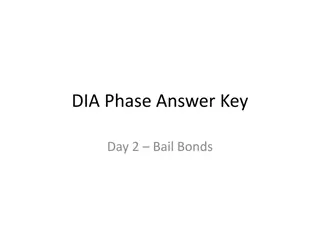Understanding Bail Bonds, Surety Bonds, and Their Differences
Bail bonds and surety bonds are legal mechanisms used to secure a defendant's release from custody before trial. Bail involves the payment of a set amount to ensure the defendant's appearance in court, while surety bonds involve a third party guaranteeing the defendant's attendance. The article explains the concepts, processes, and differences between bail and surety bonds, shedding light on the roles of defendants, courts, and bail agents in the bail process.
Download Presentation

Please find below an Image/Link to download the presentation.
The content on the website is provided AS IS for your information and personal use only. It may not be sold, licensed, or shared on other websites without obtaining consent from the author. Download presentation by click this link. If you encounter any issues during the download, it is possible that the publisher has removed the file from their server.
E N D
Presentation Transcript
What Is A Bail Bond? The court requires for the defendant to be in custody after they ve been accused of a crime till their case is settled. However, the court allows you to fight your case from outside the jail by opting for bail. Bail is an amount set by the court for the release of a defendant from jail. The court sets this amount as a surety that the defendant will return for their scheduled trials. Cash bonds or bails require that the full amount of bail money is paid to the court. This bail money is an incentive to ensure the appearance of the defendant in court trials. Once all trials are completed, this bail money is returned to the defendant. However, if the defendant fails to appear in their trials, the entire bail amount is forfeited by the court.
What Are Surety Bonds? In case the bail money is too much for a defendant to pay, they can hire bail agencies to pay for them through surety bonds. The bail agent acts as surety, who guarantees that the defendant attends all their trials. In case of absence of the defendant from their hearings, the bail bondsman can file an arrest warrant against them. The court also allows bonds agencies to hire bounty hunters to locate the defendant. If the defendant is not tracked within the prescribed period, the bail amount is forfeited.
Bails Vs Surety Bonds The difference between bail and surety bonds is that bail involving cash bonds only require the involvement of two parties the defendant and the court. Surety bonds however, require the involvement of three parties in the bailing process the court, the defendant and the bail agent.
What is Bail? Bail bond and Recognizance Bail without sureties= Just bond Bail with sureties= Bond(Form & Money)+ Sureties (Person) Bail bond= prescribed form- mentioned amount Surety= Person=undertake to pay incase of failure. Who can be sureties?























